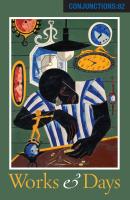Contributor History
- From My Lorenzo 3: The Tournament, Online 12-10-2008
- The Dodo, Online 02-24-2015
Biography
Sébastien Smirou is the author of three poetry volumes: Un temps pour s’étreindre (2011), Beau voir (2008), and Mon Laurent (2003), all from P. O. L. A psychoanalyst, he has authored prefaces to new translations of Winnicott’s La haine dans le contre-transfert (2014), Ferenczi’s Un petit home-coque (2012), and Freud’s Le petit Hans (2011). His translations of Italian psychoanalytical texts include Antonino Ferro’s Rêveries (2012) and Domenico Chianese and Andreina Fontana’s Immaginando (2014), both from Éditions Ithaque. Smirou codirects the journal LIGNE 13 and has just completed a book on photographer Robert Capa. Conjunctions’ 2008 publication of an excerpt from Smirou’s My Lorenzo 3: The Tournament appeared from Burning Deck in 2012. The 2015 publication of Smirou’s “The Dodo” is one of eight chapters from See About, which has been supported by an NEA translation fellowship for Andrew Zawacki and will appear in 2016 from La Presse.
